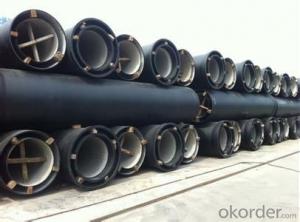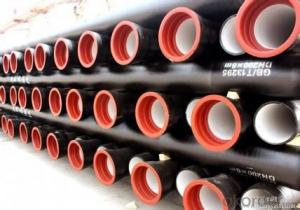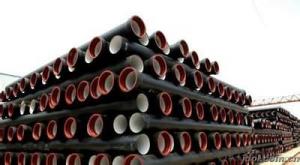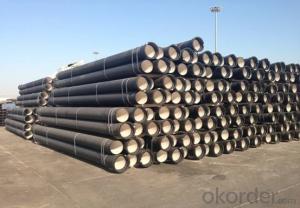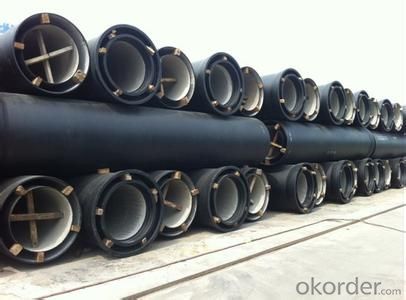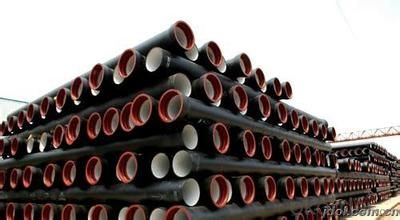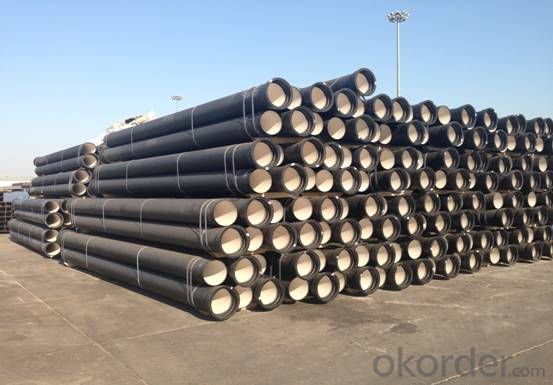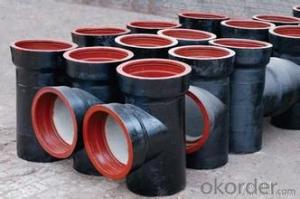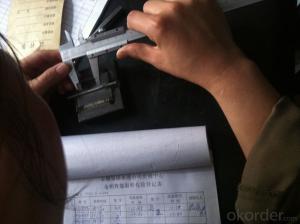DUCTILE IRON PIPE K9 DN1200
- Loading Port:
- China Main Port
- Payment Terms:
- TT OR LC
- Min Order Qty:
- -
- Supply Capability:
- -
OKorder Service Pledge
OKorder Financial Service
You Might Also Like
Ductile Iron Cast Pipe is without any defects compare with tradition casting tech, which has many advantages particularly as follow:
(1) High density. In the "vertical upward casting" process, the melt iron of centre liquid column in center crystallizer is continuously feeding for volume shrinkage caused by condensation tube at outer circumference , which lead to be free of shrinkage porosity.
(2) High purity. When melt iron pouring, the mixed impurities such as gas, dross, sand grain which are lighter than melt iron could be eliminated at furnace mouth, its impossible to enter into the crystallizer through the channel, so the melt iron into the crystallizer is very pure.
(3) Strength with toughness. The cooling speed provided by continuous crystallizer is 30 times than sand casting and 5 times than centrifugal casting, and doesn't produce white iron, the eutectic cell volume of continuous cast iron is one eighth to one tenth compare with traditional cast iron. The density of graphite nodule in ductile iron can reach 300-700 pcs/mm2. Therefore, all reason above improve the strength and toughness of continuous cast iron.
(4) Free machining. The high speed cooling make the hardening phase (such as boride, steadite) not appear like reticular, massive or thick, but diffuse like fish bone and pane in shape, moreover, there are tiny graphite flakes inlaid hardening phase. It's free machining in BrinellHardness the range of 250-300HB. However, the Brinell Hardness of 250 is top limit to common metal materials.
(5) Uniform composition of tube wall. The convection mixing of liquid column caused by marching type drawing in crystallizer make the composition of tube wall well-distributed, and concentration gradient very little.
(6) High productivity. To the wall thickness of tube under 10mm, the speed of continuous casting is 1 meter/min, to the wall thickness of tube under 20mm, the speed of continuous casting is 0.5 meter/min, which is high efficiency that centrifugal or other casting tech couldn't reach.
- Q: Are ductile iron pipes resistant to biogenic sulfide corrosion?
- Yes, ductile iron pipes are generally resistant to biogenic sulfide corrosion. Biogenic sulfide corrosion occurs when hydrogen sulfide gas, produced by the decay of organic matter, reacts with metallic surfaces. However, ductile iron pipes have a protective layer called the cement mortar lining that acts as a barrier against corrosive agents. This lining provides excellent resistance to the corrosive effects of biogenic sulfide, making ductile iron pipes a suitable choice for applications where this type of corrosion is a concern. Additionally, the high strength and durability of ductile iron pipes further contribute to their resistance against biogenic sulfide corrosion.
- Q: Principles for the antiseptic treatment of ductile iron pipes
- 4. epoxy ceramic liningEpoxy ceramic lining is suitable for sewage pipes and gas pipelines, but because of its difficult manufacturing process and high cost, it has some limitations in its use. Epoxy ceramic lining has a high adhesion and finish. It is an excellent anti-corrosion coating.5. aluminate cement coating or sulphate cement coatingThese two special cement coatings are suitable for internal corrosion protection of nodular iron pipes used in sewage pipes to improve the corrosion resistance of acid and alkali components in sewage.
- Q: Can ductile iron pipes be used for stormwater management systems?
- Yes, ductile iron pipes can be used for stormwater management systems. Ductile iron pipes are known for their strength and durability, making them suitable for various applications including stormwater management. These pipes are resistant to corrosion and can withstand high pressure, making them ideal for carrying stormwater runoff. Additionally, ductile iron pipes have a long lifespan, reducing the need for frequent replacements and maintenance. Overall, ductile iron pipes are a reliable choice for stormwater management systems.
- Q: Does the cast iron pipe need separate corrosion protection?
- The pipe has been antirust in the production process and can be used directly
- Q: What are the different coating thickness options for ductile iron pipe?
- The different coating thickness options for ductile iron pipe vary depending on the specific application and requirements. However, common coating thickness options for ductile iron pipe range from 200 to 400 microns.
- Q: How are ductile iron pipes tested for quality assurance?
- To guarantee the quality and adherence to industry standards of ductile iron pipes, a variety of testing procedures are carried out. These tests evaluate both the raw materials and the finished products, aiming to ensure the pipes' durability, strength, and overall reliability. The first step involves analyzing the chemical composition of the raw materials used in the manufacturing process. This analysis verifies that the iron, carbon, and other elements fall within the specified range, as different compositions can impact the pipes' strength and resistance to corrosion. Next, mechanical tests assess the pipes' strength and ductility. Tensile tests determine properties like ultimate tensile strength, yield strength, and elongation, which help assess the pipes' ability to withstand external pressure and bending forces. Moreover, impact tests measure the pipe's ability to resist sudden loading or impact. By evaluating the energy absorbed by the pipes under high impact force, these tests ensure that the pipes can endure accidental impacts during installation or operation. Another pivotal test is the hydrostatic pressure test, which examines the pipes' capacity to withstand internal pressure. By subjecting the pipes to a specific pressure for a designated duration while filled with water, this test ensures their capability to handle expected operating pressures without any leakage or failure. Furthermore, dimensional and visual inspections are conducted to verify that the pipes meet the required specifications. These inspections involve checking the outer diameter, length, wall thickness, and overall appearance for any defects, such as cracks, voids, or irregularities. Lastly, corrosion resistance tests evaluate the pipes' ability to resist corrosion when exposed to different environments or fluids. These tests help determine the pipes' expected lifespan and their suitability for various applications. In conclusion, these quality assurance tests are vital in ensuring that ductile iron pipes adhere to the necessary standards and deliver dependable, long-lasting performance in diverse infrastructure projects.
- Q: Are ductile iron pipes suitable for airport runway drainage?
- Yes, ductile iron pipes are suitable for airport runway drainage. Ductile iron pipes are known for their durability, strength, and resistance to corrosion, making them an ideal choice for handling heavy loads and withstanding harsh environmental conditions typically found on airport runways.
- Q: Can ductile iron pipes be made of flexible waterproof sleeves?
- The casing can be divided into ordinary casing to be 2-4 cm thick than the pipe to be used and fixed to the wall or plate, and the pipe passes through it. Flexible bushing - between the casing and pipe, with flexible material to seal the sealing effect. Rigid casing - that is, between the casing and pipe with rigid material sealed to achieve sealing effect. Waterproof casing - is the use of the casing of the environment is to prevent liquid leakage or leakage into place (such as the pool, septic tanks, basement, etc.) is on the outer wall of the bushing is not less than 1 times increase waterproof wing, this wall is poured in the casing as a whole, not because of swelling shrinkage factor and crack and leakage.
- Q: Can ductile iron pipe be used for municipal water supply?
- Yes, ductile iron pipe can be used for municipal water supply. Ductile iron pipe has excellent strength and durability, making it suitable for carrying the high-pressure water supply required for municipal systems. Additionally, its corrosion resistance and long lifespan make it a reliable choice for transporting water in urban areas.
- Q: Are ductile iron pipes resistant to sulfuric acid corrosion?
- Generally, ductile iron pipes exhibit resistance to corrosion caused by sulfuric acid. Ductile iron, known for its strength and durability, contains a substantial amount of iron, which renders it less vulnerable to the harmful effects of sulfuric acid compared to materials like cast iron or steel. Nevertheless, it is crucial to consider that the degree of resistance can vary depending on factors such as the concentration and temperature of the sulfuric acid, as well as the duration of exposure. In scenarios where the acid is highly concentrated or the temperature is elevated, additional precautions may be required to guarantee long-term protection against sulfuric acid corrosion. These measures could include lining the pipes with suitable materials or employing corrosion inhibitors.
Send your message to us
DUCTILE IRON PIPE K9 DN1200
- Loading Port:
- China Main Port
- Payment Terms:
- TT OR LC
- Min Order Qty:
- -
- Supply Capability:
- -
OKorder Service Pledge
OKorder Financial Service
Similar products
Hot products
Hot Searches
Related keywords
